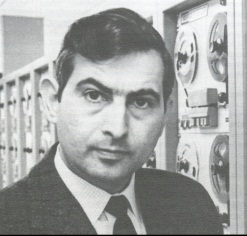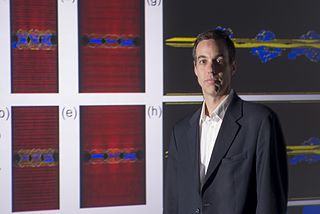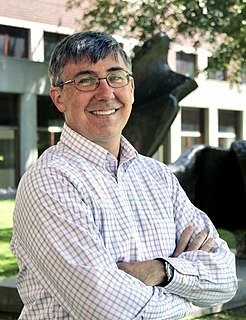Related Research Articles

Paul Pimsleur was a scholar in the field of applied linguistics. He developed the Pimsleur language learning system, which, along with his many publications, had a significant effect upon theories of language learning and teaching. Pimsleur Language Programs is an American language learning company that develops and publishes courses based on the Pimsleur Method™.

Dudley Robert Herschbach is an American chemist at Harvard University. He won the 1986 Nobel Prize in Chemistry jointly with Yuan T. Lee and John C. Polanyi "for their contributions concerning the dynamics of chemical elementary processes." Herschbach and Lee specifically worked with molecular beams, performing crossed molecular beam experiments that enabled a detailed molecular-level understanding of many elementary reaction processes. Herschbach is a member of the Board of Sponsors of the Bulletin of the Atomic Scientists.
A radioactive tracer, radiotracer, or radioactive label, is a chemical compound in which one or more atoms have been replaced by a radionuclide so by virtue of its radioactive decay it can be used to explore the mechanism of chemical reactions by tracing the path that the radioisotope follows from reactants to products. Radiolabeling or radiotracing is thus the radioactive form of isotopic labeling.

Active learning is "a method of learning in which students are actively or experientially involved in the learning process and where there are different levels of active learning, depending on student involvement." Bonwell & Eison (1991) states that "students participate [in active learning] when they are doing something besides passively listening." In a report from the Association for the Study of Higher Education (ASHE), authors discuss a variety of methodologies for promoting active learning. They cite literature that indicates students must do more than just listen in order to learn. They must read, write, discuss, and be engaged in solving problems. This process relates to the three learning domains referred to as knowledge, skills and attitudes (KSA). This taxonomy of learning behaviors can be thought of as "the goals of the learning process." In particular, students must engage in such higher-order thinking tasks as analysis, synthesis, and evaluation.
Learning styles refer to a range of competing and contested theories that aim to account for differences in individuals' learning. The many theories share the proposition that humans can be classified according to their 'style' of learning, but differ in how the proposed styles should be defined, categorized and assessed. A common concept is that individuals differ in how they learn.
Radiation chemistry is a subdivision of nuclear chemistry which is the study of the chemical effects of radiation on matter; this is very different from radiochemistry as no radioactivity needs to be present in the material which is being chemically changed by the radiation. An example is the conversion of water into hydrogen gas and hydrogen peroxide.

The Hamburg University of Technology is a research university in Germany. The university was founded in 1978 and in 1982/83 lecturing followed. Around 100 senior lecturers/professors and 1,475 members of staff work at the TUHH.
Social learning is learning that takes place at a wider scale than individual or group learning, up to a societal scale, through social interaction between peers. It may or may not lead to a change in attitudes and behaviour.

Donald Robert Sadoway is the current John F. Elliott Professor of Materials Chemistry at the Massachusetts Institute of Technology. A faculty member in the Department of Materials Science Engineering, he is a noted expert on batteries and has done significant research on how to improve the performance and longevity of portable power sources. In parallel, he is an expert on the extraction of metals from their ores and the inventor of molten oxide electrolysis, which has the potential to produce crude steel without the use of carbon reductant thereby totally eliminating greenhouse gas emissions.
The interpretation of entropy as a measure of energy dispersal has been exercised against the background of the traditional view, introduced by Ludwig Boltzmann, of entropy as a quantitative measure of disorder. The energy dispersal approach avoids the ambiguous term 'disorder'. An early advocate of the energy dispersal conception was Edward Armand Guggenheim in 1949, using the word 'spread'.

Fırat University is a state university based in Elazığ, Turkey. The university was founded in 1975 and named after the Turkish name of the Euphrates River which originates near Elazığ. Being one of the major academic institutions in the Eastern Turkey, the university has twelve schools, four institutes, one state conservatory, three vocational high schools and twenty one research centers with a strong emphasis on scientific and technological advancement and research.
Many engineering educators see service-learning as the solution to several prevalent problems in engineering education today. In the past, engineering curriculum has fluctuated between emphasizing engineering science to focusing more on practical aspects of engineering. Today, many engineering educators are concerned their students do not receive enough practical knowledge of engineering and its context. Some speculate that adding context to engineering help to motivate engineering students' studies and thus improve retention and diversity in engineering schools. Others feel that the teaching styles do not match the learning styles of engineering students.

Lanny D. Schmidt was an American chemist, inventor, author, and Regents Professor of Chemical Engineering and Materials Science at the University of Minnesota. He is well known for his extensive work in surface science, detailed chemistry (microkinetics), chemical reaction engineering, catalysis, and renewable energy. He is also well known for mentoring over a hundred graduate students and his work on millisecond reactors and reactive flash volatilization.
Radiation materials science describes the interaction of radiation with matter: a broad subject covering many forms of irradiation and of matter.

Alejandro Strachan is a scientist in the field of computational materials and a professor of materials engineering at Purdue University. Before joining Purdue University, he was a staff member at Los Alamos National Laboratory.
Professor Efstratios N. (Stratos) Pistikopoulos FREng is an alumnus of Professor Ignacio Grossmann from Carnegie Mellon University. He is a distinguished research Professor at the Department of Chemical Engineering at Texas A&M University, as well as the Director of the Texas A&M Energy Institute. From 1991-2015, he was a Professor for Chemical Engineering at Imperial College, where he pioneered multi-parametric programming and invented the concept of explicit or multi-parametric model predictive control. He has authored and co/authored more than 350 peer reviewed journal articles, authored and/or edited 9 books and has been an invited speaker to many academic conferences and lectures, including the 21st Professor Roger W. H. Sargent lecture at Imperial College London entitled "Multi-Parametric Programming & Control 25 years later: what is next?". Additionally, Professor Pistikopoulos has been elected a fellow of the Royal Academy of Engineering in 2013.

The Department of Chemical Engineering, Imperial College London is the centre of teaching and research in chemical and process engineering at Imperial College London, occupying the Aeronautics and Chemical Engineering Extension (ACEX), Bone and Roderic Hill buildings, on the South Kensington campus. Formally inaugurated in 1912, the department has over 40 faculty members, 100 postdoctoral researchers, 200 PhD researchers, 80 taught postgraduates, and 500 undergraduates. The department ranks 7th on QS's 2018 world rankings.
Stacey Bent is a professor of Chemical Engineering and Vice Provost for Graduate Education and Postdoctoral Affairs (VPGE) at Stanford University. She is the Jagdeep and Roshni Singh Professor of Engineering and a member of the National Academy of Engineering. She was the director of the TomKat Center for Sustainable Energy and a senior associate dean in the Stanford School of Engineering until 2019. She is best known for contributions to semiconductor processing, materials chemistry, and surface science. Her work has been applied toward applications in semiconductors, solar cells, and catalysts.

William H. Green Jr. is a Hoyt C. Hottel Professor of Chemical Engineering at the Massachusetts Institute of Technology, working in the field of chemical reaction engineering.

Fengqi You is a Professor and holds the Roxanne E. and Michael J. Zak Professorship at Cornell University in the United States. His research focuses on systems engineering and data science. According to Google Scholar, his h-index is 62.
References
- ↑ Felder, Richard M. (1966). Energy distributions of energetic atoms in irradiated media.
- ↑ Felder, Richard M.; Rousseau, Ronald W.; Bullard, Lisa G. (2015). Elementary Principles of Chemical Processes (4 ed.). Hoboken, NJ: John Wiley & Sons.
- ↑ Felder, Richard M.; Brent, Rebecca. (2016). Teaching and Learning STEM: A Practical Guide. San Francisco: Jossey-Bass.
- ↑ "Richard Felder's Education-Related Publications".
- ↑ Felder, Richard M.; Brent, Rebecca (1988–2017). "Random Thoughts Columns". Chemical Engineering Education.
- ↑ "Richard Felder's publications on learner-centered teaching".
- ↑ Cardellini, Liberato (2002). "An interview with Richard M. Felder / Entrevista con Richard M. Felder". Journal of Science Education. 3 (2): 62–65.
- ↑ "Index of Learning Styles".
- ↑ "Learning Styles".